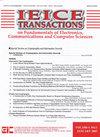基于56 gb /s adc的PAM4收发器的带假锁感知的mueller - m CDR
IF 0.4
4区 计算机科学
Q4 COMPUTER SCIENCE, HARDWARE & ARCHITECTURE
Ieice Transactions on Fundamentals of Electronics Communications and Computer Sciences
Pub Date : 2023-01-01
DOI:10.1587/transfun.2023gcp0003
引用次数: 0
摘要
虽然基于adc的接收机(RXs)采用了波特率时钟和数据恢复(CDR),如穆勒-米勒(MM) CDR,但由于没有边缘数据,RXs在处理PAM4数据模式时存在假锁点。为了解决这一问题,本文提出了一种感知假锁的锁定方案。在假锁感知锁定方案之后,时钟相位通过使用CDR环路中的FFE的1-tap参数来调整以达到最大眼高度。所提出的技术在56 gb /s PAM4收发器中实现。锁相环采用面积高效的“玻璃形”电感。RX包括一个AFE,一个28-GS/s 7位时间交错SAR ADC,以及一个带有31分路FFE和1分路DFE的DSP。一个TX基于一个7位DAC和一个4分路FFE。该收发器采用16nm CMOS FinFET技术制造,在30db损耗通道下实现了小于1e-7的误码率。测量结果表明,在眼高较大的情况下,MM CDR能够摆脱假锁点,并收敛到最佳点附近。本文章由计算机程序翻译,如有差异,请以英文原文为准。
A Mueller-Müller CDR with False-Lock-Aware Locking Scheme for a 56-Gb/s ADC-based PAM4 Transceiver
Although baud-rate clock and data recovery (CDR) such as Mueller-Müller (MM) CDR is adopted to ADC-based receivers (RXs), it suffers from false-lock points when the RXs handle PAM4 data pattern because of the absence of edge data. In this paper, a false-lock-aware locking scheme is proposed to address this issue. After the false-lock-aware locking scheme, a clock phase is adjusted to achieve maximum eye height by using a post-1-tap parameter for an FFE in the CDR loop. The proposed techniques are implemented in a 56-Gb/s PAM4 transceiver. A PLL uses an area-efficient “glasses-shaped” inductor. The RX comprises an AFE, a 28-GS/s 7-bit time-interleaved SAR ADC, and a DSP with a 31-tap FFE and a 1-tap DFE. A TX is based on a 7-bit DAC with a 4-tap FFE. The transceiver is fabricated in 16-nm CMOS FinFET technology, and achieves a BER of less than 1e-7 with a 30-dB loss channel. The measurement results show that the MM CDR escapes from false-lock points, and converges to near the optimum point for large eye height.
求助全文
通过发布文献求助,成功后即可免费获取论文全文。
去求助
来源期刊

CiteScore
1.10
自引率
20.00%
发文量
137
审稿时长
3.9 months
期刊介绍:
Includes reports on research, developments, and examinations performed by the Society''s members for the specific fields shown in the category list such as detailed below, the contents of which may advance the development of science and industry:
(1) Reports on new theories, experiments with new contents, or extensions of and supplements to conventional theories and experiments.
(2) Reports on development of measurement technology and various applied technologies.
(3) Reports on the planning, design, manufacture, testing, or operation of facilities, machinery, parts, materials, etc.
(4) Presentation of new methods, suggestion of new angles, ideas, systematization, software, or any new facts regarding the above.
 求助内容:
求助内容: 应助结果提醒方式:
应助结果提醒方式:


